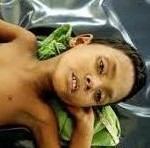Signs of Dehydration in Children
 Dehydration means lack of adequate quantity of fluid in the body of a child. Dehydration could be caused in the child due to medical reasons like vomiting or diarrhea which results in loss of fluid and this could be associated with lack of intake of fluid from mouth. In addition to sickness the child may get dehydrated due to exposure to excessive heat which results in sweating without adequate replenishment of fluid. Small children and infants are more likely to get dehydrated fast as compared to adults as they lose fluids faster and replenishment process is also slow.
Dehydration means lack of adequate quantity of fluid in the body of a child. Dehydration could be caused in the child due to medical reasons like vomiting or diarrhea which results in loss of fluid and this could be associated with lack of intake of fluid from mouth. In addition to sickness the child may get dehydrated due to exposure to excessive heat which results in sweating without adequate replenishment of fluid. Small children and infants are more likely to get dehydrated fast as compared to adults as they lose fluids faster and replenishment process is also slow.
In case of kids and infants, viral infection is the main cause of dehydration. It is the main cause of vomiting, diarrhea, excessive urination and high fever. When a child becomes sick there is a tendency to avoid intake of both food and fluid. It is also possible that the child may be suffering from some other problem like sores in the mouth which makes it difficult for him to swallow and he resists eating or drinking. The main thing to remember for the parents is that intake of fluid should be more than outgo due to any reason and the parents should be concerned if their child refuses to eat and drink for a long time.
When a child gets dehydrated he starts to display the following signs or symptoms:
- The child has sunken eyes i.e. the eyes of the child get smaller, sink and black circles start to develop around eyes.
- The frequency and quantity of urination decreases. This is also associated with urine turning yellow.
- Soft spot on the front of the head of the baby gets sunk.
- The child cries without tears in the eyes.
- The mucus membrane or the lining of the mouth or tongue give a dry look.
- The child is too lethargic and gets irritable.
- A child complains of abdominal pain or has high fever.
In case you notice any of the above symptoms or the child is continuously vomiting, an immediate visit to the doctor is necessary. In acute cases emergency treatment may also be required. When at the clinic of the doctor he will try to ascertain if the child is dehydrated and the possible cause. He may ask you to get the blood and stool tests done to ascertain and identify infection in blood, bladder or intestines.
Treatment
After ascertaining the cause he will suggest medicines. In case of milder dehydration the doctor will ask you to rehydrate the child by giving him oral sips of the rehydration solution. If the child is able to retain water he will be sent home. In case of moderate dehydration where the weight loss is about 5 to 10% of the body weight the child may be advised to be given fluid intravenously. After the child has been injected fluid and he takes fluid from the mouth and it is retained by the body, the doctor will send the child back home. In case of severe dehydration and if the body weight loss is more than 10%, the child may require injection of series of bottles of IV fluid and will be kept under observation for a longer time.
When back home after visiting the doctor, do remember to follow the instructions carefully and properly. This is essential for the health of your child.
Generally children get dehydrated due to viral infection which results in vomiting and diarrhea. When a child suffers from this disease it is essential that the process of replenishment of fluid lost be started immediately. There was a belief amongst old ladies that water should not be given if the child is suffering from diarrhea. This is a fallacy. Start administrating electrolyte or ORS solution which contains dissolved minerals, salt and sugar. These are available pre-packed at all medical stores. In case it is not possible to get this pack you can start with mixing one tea spoon of salt with equal quantity of baking soda and four spoons of sugar in one litre of boiled and cooled water. Start administering this solution spoon by spoon at regular intervals.
In case the child is more than two years of age you can give him flat soda drink, the child will like it and fluid intake will increase. When the vomits and motions stop you can start with a mixture of banana, rice, apples and toast. This will provide nutrition and starch to the child. If the child is being breast fed it should be continued during sickness.
Remember to start rehydration process the moment there is doubt of dehydration as it could have serious consequences on the vital organs and brain of the child.